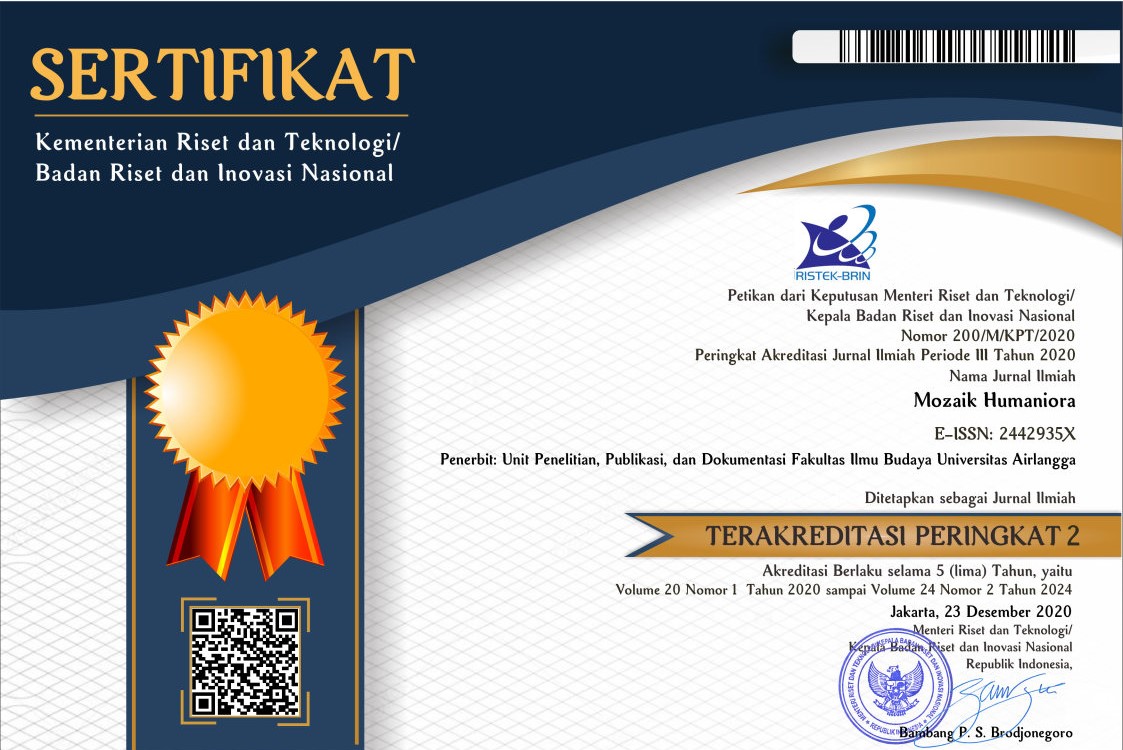Consumption Practices of Halal Products by Indonesian Muslims in Osaka Japan: A Phenomenological Study of Religion
Downloads
Indonesia is one of the countries actively sending migrants to Japan. In 2021, 59,820 Indonesians were recorded as living in Japan, with an estimated 70—80% identifying as Muslim. This study aims to describe the dynamics of halal product consumption among Indonesian Muslims in Osaka, Japan, through the lens of religious phenomenology. Data were analyzed using a qualitative approach with survey and descriptive-analytical methods. Primary data were collected through questionnaires and structured interviews with 31 respondents and 8 informants residing in Osaka between November 2022 and May 2023. The findings reveal that halal consumption practices in Osaka exhibit complex religious dynamics, transcending mere textual compliance with Islamic law. Halal consumption reflects spiritual efforts involving emotional, cognitive, and multisensory reflection. Informants with high levels of religious adherence demonstrated profound commitment through proactive efforts to consume halal products. These activities also fostered social solidarity, extending the meaning of worship to a collective dimension. Informants with moderate levels of religious adherence displayed creative adaptation to challenges, such as balancing flexibility with halal principles in the context of limited access and information. Religious phenomenology reveals that halal consumption practices among Indonesian Muslims in Osaka are not only efforts to maintain religious identity but also reflections of the adaptation and negotiation of spiritual values within a predominantly non-Muslim environment.
Adidaya, Y. A. 2016. “Halal in Japan: History, Issues and Problems: The Effect of the “Halal Boom” Phenomenon on Japanese Society and Industry.” Oslo: University of Oslo. https://www.duo.uio.no/handle/10852/52149.
Akhiyat. 2019. “Debates on Religious Studies in the Phenomenology Perspective and Its Contribution to Interfaith Tolerance.” Ulumuna: Journal of Islamic Studies 23 (1), 163—192. https://doi.org/10.20414/ujis.v23i1.347.
Allen, D. 2005. Phenomenology of Religion. Routledge.
Alvis, J. W. 2019. “God’s Playthings: Eugen Fink’s Phenomenology of Religion in Play as Symbol of the World.” Research in Phenomenology 49, 88—117. DOI: https://doi.org/10.1163/15691640-12341412.
Aminah, S. & B. A. S. Bhakti. 2022. “Multiculturalism in Japan Halal Tourism: Localizing the Concept of Halal.” Journal of Tourism and Cultural Change 21 (3), 273—289. DOI: https://doi.org/10.1080/14766825.2022.2106788.
Anjom-e Rouz, S. & Gh. Elmi, Gh. 2023. “A Study of Chantepie’s Phenomenology of Religion and the Evaluation of Its Critics.” Journal of Philosophical Investigations 17 (43), 574—595. DOI: https://doi.org/10.22034/JPIUT.2022.47860.2963.
Batubara, C. & I. Harahap. 2022. “Halal Industry Development Strategies: Muslims’ Responses and Sharia Compliance in Indonesia.” Journal of Indonesian Islam 16 (1), 103—132. DOI: https://doi.org/10.15642/JIIS.2022.16.1.103-132.
Cibotaru, V. 2023. “Interreligious Dialogue: A Challenge for Phenomenology.” Religions 14 (3), 302—313. https://doi.org/10.3390/rel14030302
City Population. 2020. ŌSAKA City. https://shorturl.at/8nVTx
Connolly, P. (ed.). 1999. Approaches to the Study of Religion. London: Cassell.
Day, A. (ed.). 2016. Religion and the Individual: Belief, Practice, Identity. Routledge. DOI: https://doi.org/10.4324/9781315604848.
Erni, P. & I. Roosiani. 2021. “Halal Product Certification in Japan as Part of the Shinzo Abe Government’s Economic Strategy.” IDEA Jurnal Studi Jepang 3 (2), 130—142. DOI: http://dx.doi.org/10.33751/idea.v3i2.4482.
Harding, B. 2021. “Minimalist Phenomenology and Van der Leeuw’s Phenomenology of Religion.” Journal for Continental Philosophy of Religion 3 (1), 49—64. DOI: https://doi.org/10.1163/25889613-bja10008.
Ishak, F. I., M. D. Awang, S. A. Rahman, A. Hasan, & J. K. Liauw. 2024. “Auditors of Halal Foreign Certification Bodies Using Malaysian Halal Standards in Japan: Challenges and Suggestions.” In Analyzing Education, Sustainability, and Innovation. SpringerBriefs in Applied Sciences and Technology, edited by A. Ismail, F. N. Zulkipli, R. Mahat, M. A. Mohd Daril, & A. Öchsner. (eds.). DOI: https://doi.org/10.1007/978-3-031-55948-8_7.
Jamaludin, N. F. & K. Sugawara. 2022. “Halal Logistics Certification and Regulations in Japan.” In Halal Logistics and Supply Chain Management: Recent Trends and Issues, edited by Nor Aida Abdul Rahman, Azizul Hassan, Hajjah Zawiah Abdul Majid. Routledge. DOI: https://doi.org/10.4324/9781003223719-20.
Knibbe, K. & P. Versteeg. 2008. “Assessing Phenomenology in Anthropology: Lessons from the Study of Religion and Experience.” Critique of Anthropology 28 (1), 47—62. DOI: https://doi.org/10.1177/0308275X07086557.
Leng, X. 2022. “Martin Heidegger on Primordial Christian Life Experience: A Phenomenological Theological Perspective.” Religions 13 (11), 1082—1096. DOI: https://doi.org/10.3390/rel13111082.
Luthfi, M., S. Aminah, & Z. Rasam. 2024. “Fiqh Aqalliyah as a Legal Alternative to Halal Standardization in Japan as a Non-Majority Muslim Country.” Indonesian Journal of Islam and Muslim Societies 14 (1), 177—202. DOI: https://doi.org/10.18326/ijims.v14i1.177-202.
Mahmud, A. 2017. “Hadith Studies on Halal, Haram, and Shubhat.” Journal of Adabiyah, 17 (2), 124—142. DOI: https://doi.org/10.24252/JAd.v17i1i2a3.
Maxwell, J. A. & L. E. Reybold. 2015. “Qualitative Research.” In International Encyclopedia of the Social & Behavioral Sciences, edited by James D. Wright. Elsevier.
Mujib, A. 2015. “Phenomenological Approach in Islamic Studies.” Al-Tadzkiyyah: Journal of Islamic Education 6.
National Institute of Population and Social Security Research. 2023. Population Statistics of Japan 2023. https://www.ipss.go.jp/psj2023/PSJ2023-1.
Copyright (c) 2024 Eman Suherman

This work is licensed under a Creative Commons Attribution-ShareAlike 4.0 International License.

Mozaik Humaniora is licensed under a Creative Commons Attribution-ShareAlike 4.0 International License. Both authors and Mozaik Humaniora agree with the following attribution of journal:
1. Copyright of this journal is possession of Author, by the knowledge of the Editorial Board and Journal Manager, while the moral right of the publication belongs to the author.
2. The journal allows the author(s) to retain publishing rights without restrictions
3. The legal formal aspect of journal publication accessibility refers to Creative Commons Attribution Share-Alike (CC BY-SA).
4. The Creative Commons Attribution Share-Alike (CC BY-SA) license allows re-distribution and re-use of a licensed work on the conditions that the creator is appropriately credited and that any derivative work is made available under "the same, similar or a compatible license”. Other than the conditions mentioned above, the editorial board is not responsible for copyright violation.


















